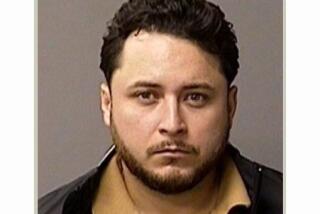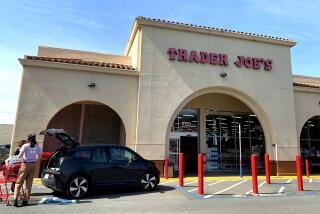Glatt kosher market sold meat ‘way too cheap,’ competitors say
A glatt kosher meat market owner facing questions on his product was viewed skeptically by competitors, said the private investigator who sparked the controversy.
Michael Engelman, who owns the Doheny Glatt Kosher Meats market in West Los Angeles, is accused of selling meat not properly certified kosher. The controversy started when private investigator Eric Agaki secretly videotaped Engelman working.
The video appears to show the Doheny market owner bringing meat into his store after a supervisor who certifies kosher products had left.
Agaki said his investigation into Doheny began about seven months ago when he was approached by a local rabbi. The rabbi told him some community members were frustrated because Doheny was selling meat “way too cheap” and “putting a lot of people out of business.”
The video recordings released to KTLA-TV purport to show one of Engelman’s associates loading his car with repacked glatt kosher boxes at an unsupervised warehouse in Reseda in early March.
The associate transfers them to Engelman at a McDonald’s, Agaki said, and Engelman unloads the boxes at his market when the overseer is absent.
Agaki, who is Jewish, said he had no relationship with Engelman prior to the start of the investigation. But he said that during his investigation, it became clear that “a lot of distributors had problems with Doheny.”
Kosher meat is considerably more expensive than meat found in a regular supermarket because of the extra supervision and inspections required. Mixing glatt kosher meat with non-kosher meat, or even kosher meat of a lesser quality could help drive down prices if it was falsely advertised.
“A lot of people wanted to see Doheny go down,” Agaki said.
The Rabbinical Council of California has pulled Doheny’s kosher certification and is threatening legal action; the U.S. Department of Agriculture confirmed they also are investigating the store.
This not the first time a secular agency has stepped in during a kosher meat crisis in Los Angeles.
In 1990, Emes Kosher Meats had its kosher certificate suspended by the same council of rabbis that yanked Doheny’s. At the time, Emes was the biggest kosher retailer in Los Angeles.
The scandal forced the market to close for months before reopening, then closing again. In the wake of the scandal, the Rabbinical Council of California adopted toughened rules governing the eligibility of butchers for kosher certification and expanded their inspections.
County officials also stepped up their monitoring of records kept by kosher butcher shops and investigated whether the practice of mixing kosher and non-kosher meat was widespread.
Like Doheny, Emes Kosher attracted many customers because of its wide variety and low prices. In an advertisement in a Jewish weekly, Emes owner Semyon Rachshtut blamed closure of his market on “suppression received from the Rabbinical Council of California.”
Tuesday was the last day of Passover, and phone calls to the rabbinical council were not immediately returned. But in an interview with The Times, Agaki flatly denied those rumors, saying his probe of Doheny Glatt Kosher meat market “felt like the right thing to do.”
“How can anybody set them up?” Agaki said of Engelman and his associates. “They did what they did. Nobody made them do it.
“Nobody hired me, nobody paid me,” he continued. “If anybody wants to pay me and send me donations, I’m glad to accept them.”
ALSO:
AP’s ban on the term ‘illegal immigrant’ sparks fierce debate
Greuel vows to be independent from unions backing her for mayor
USDA investigates kosher butcher accused of using non-kosher meat
More to Read
Start your day right
Sign up for Essential California for news, features and recommendations from the L.A. Times and beyond in your inbox six days a week.
You may occasionally receive promotional content from the Los Angeles Times.







